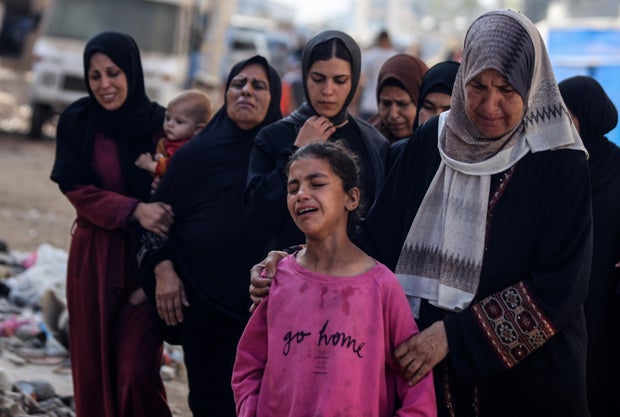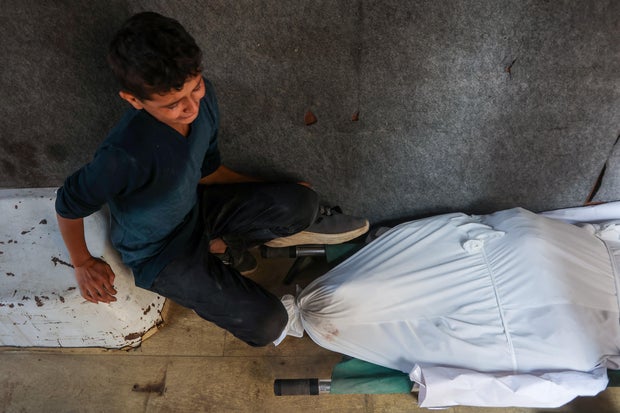U.N. agency slams U.S.-backed Gaza aid effort as “a death trap,” as health officials say 79 people killed
Tel Aviv — The head of the United Nations agency supporting Palestinian refugees has condemned a controversial U.S. and Israeli-backed humanitarian organization operating in Gaza, calling it “an abomination” and “a death trap costing more lives than it saves.”
The statement from Philippe Lazzarini, commissioner general for UNRWA, criticizing the Gaza Humanitarian Foundation (GHF) came as the Hamas-run Gaza Ministry of Health said 79 people had been killed in the Palestinian territory over the previous 24 hours, 51 of whom it said had died near GHF sites.
“There is no food. The people have starved to death, and nobody gives a damn about Gaza. Nobody talks about what’s happening in Gaza,” one man at Gaza’s Nasser hospital, where injured people were being brought for care, told CBS News. “Young men in their prime are dying. What brings these youngsters to go to the aid sites? It’s hunger. The fire of hunger has ravaged the people.”
Another man at Nasser hospital said: “I send this message to the mothers and fathers, not to send their children. Youngsters who are barely 17 are dying in vain, just to get some hummus or a bag of flour to feed their families. The Israeli army lies in wait to kill them as you can see here. Look at the victims here. Most of them have been shot in their heads. This American charity is a trap of those youngsters. Young people in their prime are dying. This is a trap.”
Majdi Fathi/NurPhoto/Getty
“Humanitarian principles must be reinstated,” Lazzarini said in his statement. “The humanitarian community, including UNRWA, has the expertise and must be allowed to do their jobs and provide assistance with respect and dignity.”
“In Gaza, atrocities continue while global attention shifts elsewhere,” Lazzarini said after 12 days of air and missile strikes between Israel and Iran. “A confined and captive population is bombarded, besieged and constantly displaced. More than 55,000 people are reported killed, most of them women and children. Two million people are being starved, among them 1 million children. We have said it several times and I say it once again: no place is safe in Gaza, and no one is spared.”
CBS News’ team in Gaza reported a decrease in the intensity of Israeli bombardments on Monday, with drones and fighter jets seen in the skies, but most of the violence affecting people approaching GHF aid distribution points.
GHF said in a statement on Tuesday that distribution “at all sites proceeded without incident. However, today GHF formally raised complaints with the IDF regarding instances of possible harassment by Israeli soldiers directed at our convoys” headed to one of its aid hubs.
The group also pushed back, as it does in all of its daily statements, against what it called “false allegations of attacks near aid distributions sites,” and it added that the “Hamas-affiliated Gaza Health Ministry is not a credible source of information, as it fails to report any UN convoys or distribution sites that are linked to violent incidents.”
OMAR AL-QATTAA/AFP/Getty
Israel and the United States have said the new GHF-organized system is needed to prevent Hamas from siphoning off aid, which the U.S.-designated terrorist organization denies doing. The funding for and management of GHF have remained unclear since it began operations in mid-May, but it is staffed by private, well-armed American security contractors.
Meanwhile, a limited number of trucks carrying humanitarian aid for the U.S.-based World Central Kitchen nonprofit group were reported to have entered the Gaza Strip.
COGAT, the agency that coordinates Israel’s operations in the Palestinian territories under the authority of the country’s Ministry of Defense, said over half a million pounds of baby food had entered Gaza Monday. The Israel Defense Forces said 79 trucks from various aid organizations carrying food and medical supplies had entered Gaza on Monday.
Before and during much of the ongoing war in Gaza, UNRWA provided education, health care, humanitarian relief and social services to hundreds of thousands of Palestinian refugees in multiple countries across the Middle East, but the group has long been accused by Israeli authorities of links to terrorism.
In January, two Israeli laws came into effect banning UNRWA operations in the Occupied Palestinian Territories.
Israeli officials accused a dozen UNRWA staff members in Gaza of being complicit in the Hamas-orchestrated Oct. 7, 2023 terrorist attack that sparked the war. UNRWA’s Lazzarini, following an internal U.N. investigation, fired nine staff members, but said the agency’s priority remained “to continue lifesaving and critical services for Palestine refugees in Gaza and across the region.”
UNRWA later said the Israeli government had not provided any evidence for its accusations, a position which was supported by a later independent U.N. review. However, the allegations against UNRWA prompted the U.S. government to temporarily pause its funding for the agency, and President Trump, earlier this year, made the end of American support for the agency indefinite.
In March, UNRWA issued a public appeal for a resumption of the American funding.
“UNRWA’s financial situation is dire,” Lazzarini said Tuesday. “Cash flow is managed now on a weekly basis instead of monthly let alone yearly. Without additional funding, I will soon have to take unprecedented decisions affecting our services to Palestine Refugees across the region. The loss of UNRWA’s stabilising effect on a region increasingly in turmoil will also be consequential.”
Lazzarini stressed that UNRWA provides a range of services to Palestinian refugees that a functioning Palestinian state, if one were to be created, could take over, including education and medical care.
“A genuine, time-bound political process would allow the Agency to finally transition its government-like services to empowered and prepared public institutions serving Palestinians,” he said. “In the absence of an orderly transition, the sudden loss or reduction of UNRWA’s services will only deepen suffering and despair across the occupied Palestinian territory. It might spark unrest in the neighbouring countries. This is something that the region cannot afford, especially now.”







